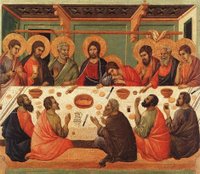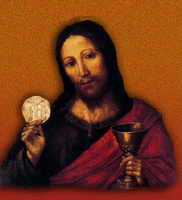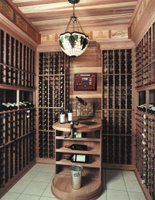Two Wines? Too Much!
 Regular readers know that I rarely respond to others’ challenges, even if they’re made public. Doing so prevents trimming my backlog of unanswered questions and also risks generating more heat than light or accidentally allowing my reply to descend to a personal level.
Regular readers know that I rarely respond to others’ challenges, even if they’re made public. Doing so prevents trimming my backlog of unanswered questions and also risks generating more heat than light or accidentally allowing my reply to descend to a personal level.Still, however, several people have asked either me or my wife if I had anything to say about a letter published in the 21 June Concordian (the local newspaper which carries Ask the Pastor) about my column from three weeks ago on Communion Practices. Any typos, including sentence fragments and reference to an incorrect verse from 1 Corinthians are reproduced as published. I don’t know if the errors belong to the paper or to the letter writer.
In response to Pastor Snyder’s article in the June 7 issue of The Concordian where he stated regarding communion “what’s in the cup should be wine, not grape juice. The latter was unknown in Jesus time since no means of preserving unfermented juice existed.”
That statement is not correct. Bible Wines, a book written by William Patton in 1871, mentions two very simple methods, boiling and filtering, which were known and practiced in the first century. Several other practices were also in use to preserve the juice of the grape without producing an intoxicating beverage.
Though the word may be translated “wine” in the Bible, one has to determine the original meaning, not just the modern day usage. The word “wine” is a generic term.... Just because “wine” is interpreted as alcoholic in one place, it does not mean it is in all.
Jesus, in harmony with the Passover, used unleavened bread and unfermented “fruit of the vine” Mt. 26:29. Fermentation requires a leavening agent the use of any leaven would cause one to be cut off from the house of Israel, Exodus 12:15.
Pastor Snyder also uses a wedding as an example of the apparent binding aspect of the Lord’s Supper and it’s not being just a remembrance of Jesus’ crucifixion. But, Jesus himself said it was to be in remembrance of Him, Lk. 22:19. This is a memorial service, not like a wedding that does anything. It should cause one to examine oneself 1 Cor. 11:27 [sic; s.b. 11:28]. One becomes “bound” to the Lord by believing, Jn 8:24; repenting of sin; Lk. 13:3; confessing Christ before men, Mt. 10:32; and then by being baptized for the remission of sins, Acts 2:28; 22:16.
Unfortunately, doing full justice to the letter writer’s challenge would involve many, many pages. Therefore, I’ll only highlight a few things and then leave it up to you, the reader, to decide whose opinions are substantiated.
The gentleman who wrote the challenge is associated with the churches of Christ, which grew out of the American restoration movement of the 1800s. These churches generally deny the Christian creeds, treat Holy Communion as an ordinance but not a means of grace, practice a believers’ baptism for the remission of sins, and have other theological and practical distinctions varying sharply from most of Christendom.
Let’s address the first challenge, my assertion that wine, not grape juice should be used in communion. While I disagree with the writer, I thank him for introducing me to Patton’s Bible Wines, a book holding an exalted status among many abstinence advocates. Unlike many old volumes, Bible Wines is in publication and I quickly found it through online book sellers. Additionally, I discovered countless web sites and internet forums where Patton is regularly and religiously quoted, usually by those wanting to remove all traces of alcohol from our diet.
A reader’s review at Amazon.com notes, “I almost feel that I wasted my money, but at least I have documented proof that the ‘Two Wine Theory’ is completely absurd.... Much of the material for this book (originally published in 1874) came from two articles (‘Bacchus’ and ‘Anti-Bacchus’) which were thoroughly refuted in 1841 by John McLean in the April and October issues of the Princeton Review.” As the aforementioned reviewer notes, Rev. McLean went into considerable depth debunking Patton’s claims — some thirty years before Patton made them!
I also followed the review’s suggestion and searched the web for the “two wine theory.” A staple among many involved in prohibition and temperance circles, it follows the same reasoning as does the letter writer, claiming that the Bible knows of both alcoholic and non-alcoholic “wines.” Since space doesn’t permit a detailed response, you’ll have to take me at my word that I spent much of my day off investigating the claims and counter-claims.
A summary of these sites and other areas I researched reveals, among other things, that the “boiling and filtering” mentioned by Patton actually aid good fermentation. The steps are designed to purify and concentrate ingredients in order to produce a stronger wine with less chance of it deteriorating into vinegar due to bacterial invasion.
Prohibitionists such as the letter writer make much of the different Biblical words translated as “wine.” Most reputable Bible scholars put these down to regional differences, loan words from different cultures, varying time periods, differing methods of preparation and fermentation, and, of course, whether or not the wine had been kept and aged or was being drunk fresh.
 The comments about “leaven” and the Passover probably need a bit of clarification, also. The writer mentioned that yeast and any “leaven” — or its final products — had to be removed before Passover. Even if this applied to the beverages and not just the bread — and Exodus 12:15 cautions against anyone who “eats what is leavened (emphasis added)” — grapes normally need no added yeast in order to begin fermentation. A natural yeast grows on their skins and fermentation actually begins even while the grapes are still being crushed. Furthermore, by the time fermentation is complete, the yeast is killed by the very alcohol it creates! Whatever the case, even the most law-bound orthodox Jews use alcoholic wine in Passover celebrations to this very day, so they mustn’t consider it as a “leavened” food.
The comments about “leaven” and the Passover probably need a bit of clarification, also. The writer mentioned that yeast and any “leaven” — or its final products — had to be removed before Passover. Even if this applied to the beverages and not just the bread — and Exodus 12:15 cautions against anyone who “eats what is leavened (emphasis added)” — grapes normally need no added yeast in order to begin fermentation. A natural yeast grows on their skins and fermentation actually begins even while the grapes are still being crushed. Furthermore, by the time fermentation is complete, the yeast is killed by the very alcohol it creates! Whatever the case, even the most law-bound orthodox Jews use alcoholic wine in Passover celebrations to this very day, so they mustn’t consider it as a “leavened” food.Readers so inclined will be able to similarly spend hours reading everything from scholarly studies to crackpot claims involving a number of Hebrew and Greek words from Old and New Testaments. You can “test the spirits” of all those who’ve weighed in and see for yourself who sounds like an extremist and who seems to be in line with both the clear word of Scripture and evidence from history, archaeology, and biological science. If you have access to any Bible dictionaries, concordances, or encyclopedias, whether in books or on software, I encourage you to investigate instances where various types of “wine” appear in Scripture. Search any resources not published by extreme sectarian sources and you’ll find that all those words used for wine and strong drink indicate potable alcohol, not juice.
Where will you end up? That depends in part upon your thinking when you start. If you think that the Bible supports a narrow, restrictive Christianity based as much upon moralism as grace, you might find yourself agreeing with Bible Wines. If you view any drinking of alcohol as a great moral evil, even in the context of Holy Communion, Patton’s claims will probably fuel your desire to remove all use of wine in church.
However, if you already believe that Scripture recommends moderation in employing all of God’s gifts, you’ll likely align yourself with the opponents of Patton. If reading the Bible indicates that Jesus made wine (John 2:1-11), drank wine (Matthew 26:29), and imbibed often enough to be called “a drunkard (Luke 7:33-34),” then Bible Wines will certainly reveal itself to be (at best) an amusing curiosity or (at worst) a skewed and wrong-minded interpretation of Holy Scripture.
 Of course, I still must meet the more serious challenges of the writer, such as his denial of the Biblical Christian doctrine that the Lord’s Supper is more than just a memorial meal. I agree with the writer that it is “in remembrance of Him,” but fail to see how he ignores that it is also what Jesus says it is: “This is my body ... this is my blood. (Matthew 26:26-28)” The Supper doesn’t only talk about what Jesus did. It is, as Paul wrote, a true communion, “a participation in the blood of Christ [and] ... the body of Christ. (1 Corinthians 10:16)”
Of course, I still must meet the more serious challenges of the writer, such as his denial of the Biblical Christian doctrine that the Lord’s Supper is more than just a memorial meal. I agree with the writer that it is “in remembrance of Him,” but fail to see how he ignores that it is also what Jesus says it is: “This is my body ... this is my blood. (Matthew 26:26-28)” The Supper doesn’t only talk about what Jesus did. It is, as Paul wrote, a true communion, “a participation in the blood of Christ [and] ... the body of Christ. (1 Corinthians 10:16)”I cannot fathom such people completely denying that drinking the blood of Christ in Holy Communion grants “forgiveness of sins. (Matthew 26:28)” The writer seems only to want us remember that we are forgiven by remembering that Christ died for our forgiveness. Meanwhile, I read Scriptures telling us that we receive what Jesus says we receive — His body, His blood, His forgiveness, His new covenant — “as often as [we] drink it. (1 Corinthians 11:25)” Indeed, making the Lord’s Supper into nothing more than a memorial betrays an ignorance of the full meaning of Greek and Hebrew words usually translated “remember.”
The letter writer concludes by suggesting that we come to Christ and are “bound” to Him by “believing” (John 8:24), “repenting” (Luke 13:3), “confessing Christ” (Matthew 10:32), and “being baptized for the remission of sins” (Acts 2:38; 22:16). All of these things are of Scripture. However, we cannot mix or mis-order human responses with God’s forgiving work in us. Whether by spoken Word (only), or the Word active in baptism’s water, what God does to forgive, cleanse, and renew us must precede any God-pleasing and edifying actions on our part.
We cannot “believe” unless the Holy Spirit moves us so to do. We cannot “repent” of (turn away from) sins and turn toward Christ unless He is active in Word and Spirit, moving us in this direction. We cannot “confess” Him unless He lives within us, giving voice to the confession. The gentleman who opposes the position of the Holy Christian Church of using wine in the Sacrament should follow his own advice regarding 1 Corinthians 11:28 and examine himself for signs of moralism, legalism, and attempting to make a new law out of the Supper’s wondrous Gospel.
 I further recommend that he and like-minded individuals should carefully study the surrounding verses, as well. Paul never rebuked the Corinthians for what they were eating drinking, but how they ate and drank: “One goes hungry, another gets drunk. (11:21)” How were they getting “drunk” if they weren’t already using alcoholic wine — a beverage that Paul did not condemn?
I further recommend that he and like-minded individuals should carefully study the surrounding verses, as well. Paul never rebuked the Corinthians for what they were eating drinking, but how they ate and drank: “One goes hungry, another gets drunk. (11:21)” How were they getting “drunk” if they weren’t already using alcoholic wine — a beverage that Paul did not condemn?Continuing the topic of examination, along with clearly seeing ourselves as sinners in need of forgiveness, Paul also noted that we need to examine the content of the Supper, namely the true body and blood of our Lord Jesus Christ. Anyone eating and drinking without regard of self or the nature of the Supper “will be guilty of profaning the body and blood of the Lord. (11:27)” That the body and blood are truly present and not merely piously “remembered” is clear from verse 29: “Anyone who eats and drinks without discerning the body eats and drinks judgment on himself.” This discernment is vital, as verses 30-34 make clear. Life and death — perhaps eternal life and death — are the stakes.
Note: Previous posts mentioning wine and Holy Communion include Alcohol in Holy Communion and Communion Wine.
Scripture quoted from The Holy Bible, English Standard Version™, © 2001 by Crossway Bibles.
Send email to Ask the Pastor.
Walter Snyder is the pastor of Holy Cross Lutheran Church, Emma, Missouri and coauthor of the book What Do Lutherans Believe.
Technorati Tags: Holy Communion | Lord’s Supper | Communion | alcohol | wine | Bible Wines | William Patton | leaven | fermentation | churches of Christ | Campbellites

3 Comments:
The reviewer stated, "Much of the material for this book (originally published in 1874) came from two articles (Bacchus and Anti-Bacchus) which were thoroughly refuted in 1841 by John McLean in the April and October issues of the Princeton Review." He did not say that McLean refuted Patton's book, but the two articles Patton sites.
If you have the book why not look up and see how much Patton relied on these articles? Did you read McLean's articles?
Good points, and as a CoC member, a notable minority of us recognize the facts, and even know our own history. We used wine until prohibition. The influence of Rockefeller money in prohibition movements convinced us to change and forget our former practice. Similarly for the change from pacifism to pro-war and pro-racism. Most of the CoC became pro-state patriotic idolators unaware that we bought into worldly cultural values like prohibition, grape juice, and war.
The information Patton got from "Bacchus" and "Anti-Bacchus" was refuted by MacLean over 30 years before Patton relied on it for his book. The information Patton presented as the "science of fermentation" is refuted by the actual science of fermentation. I don't think that leaves room for much that Patton might have gotten correct.
--
Grump
Post a Comment
<< Home